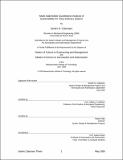Multi-stakeholder quantitative analysis of sustainability for value delivery systems
Author(s)
Catanzaro, Sandro N
DownloadFull printable version (3.865Mb)
Other Contributors
Massachusetts Institute of Technology. Dept. of Aeronautics and Astronautics.
Advisor
Jeffrey A. Hoffman.
Terms of use
Metadata
Show full item recordAbstract
This thesis presents a model to analyze multi-stakeholder decision-making and its application to Space Exploration strategy. The analysis of decision-making for Space Exploration is especially difficult because of the complexity of the value delivery process and the extended time frame to deliver value. In order to analyze the sustainability of Space Exploration, we use the hypothesis that only stakeholder groups that should be considered are those that control resources needed for the survival and growth of the initiative. Consequently, the key to sustainability lays in a tiered multi-attribute decision- making process, where the top layer is populated by the needs of Space Exploration as a Value Creating System (VCS), its second layer is the stakeholders who control the resources that satisfy those needs, and its third layer is the stakeholders' needs. Our model tries to measure the ability of different architectures to increase stakeholder needs satisfaction, thus increasing the likelihood that those stakeholders will provide resources back to the VCS, which is the key to the VCS's survival. The model uses a numerical extension of the Kano model of quality to weight the criticality of the needs. The feedback loop of value to and from the VCS is modeled as a flow of vectorial elements. (Cont.) The model uses the divergence in the data captured to generate a stochastic process, thus providing a probabilistic mapping of the characteristics of each architecture option. The main output is a graphic with the trade between the architecture option capability of increasing the feedback of resources to the VCS in one axis and its capability of gathering consensus across the different stakeholder groups in the other axis. This diagram shows that there is an efficient frontier which trades value and stability, showing some architectures as less stable because of the alienation of some stakeholders, and thus with reduced consensus, but at the same time a higher feedback of resources to the VCS. Other architectures are shown to be more stable by creating a consensus opinion among stakeholders; but in order to do so, they might sacrifice some amount of resource feedback to the VCS. Keywords Stakeholder analysis, space exploration, space systems architecture, value delivery, feedback, stochastic model, organization strategy, Kano model of quality, multi-attribute utility, system dynamics, decision making, system architecture.
Description
Thesis (S.M.)--Massachusetts Institute of Technology, System Design and Management Program; and, (S.M.)--Massachusetts Institute of Technology, Dept. of Aeronautics and Astronautics, 2006. This electronic version was submitted by the student author. The certified thesis is available in the Institute Archives and Special Collections. Includes bibliographical references (p. 254-255).
Date issued
2006Department
System Design and Management Program.; Massachusetts Institute of Technology. Department of Aeronautics and AstronauticsPublisher
Massachusetts Institute of Technology
Keywords
System Design and Management Program., Aeronautics and Astronautics.